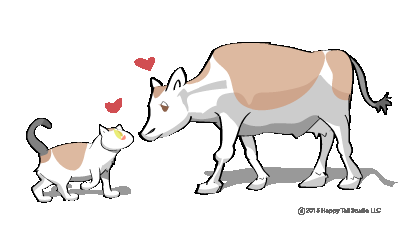Action: Farm Animal Welfare
Veal. Baby cows. Calves. Cows. Cattle. Beef. Downers. What’s the point of these differentiations?
A pending regulation brings the issue of differentiating language to the forefront, pushing for the USDA to address a loophole that allows for the slaughter of calves that are too weak to stand on their own, often called “downer calves.” Downer cows are sick, injured, or otherwise unable to move. Current humane handling standards for slaughter are specific about downer cows, but not calves. What qualifies as inhumane treatment of calves ?
The regulation differentiates between non-ambulatory cows and calves. However, calves can’t always walk. Their leg muscles are—often intentionally—underdeveloped and they may be slaughtered shortly after birth. But when investigations found a number of abuses to weak calves at a slaughterhouses, this brought attention and public scrutiny to these practices, which are usually far from consumer view.
Closing the loophole would likely change how those 700,000 calves are treated. Without a doubt, bringing reform and animal welfare goals into focus improves the conditions among animals who live and die in the food pipeline. Institutionally, ensuring standards for humane handling, transport, and slaughter, entrusting agencies to enforce the Humane Slaughter Act, and taking steps to evaluate and improve these standards are each important efforts.
How doe this play out personally? Is the category of “young animals” distinct? How you react to news about the loophole may tell you something about how you really feel about these categories of animals. It may also tell you something about how you feel about eating young animals, maybe any animals at all.
If reading about abuse to calves that are too sick, injured, or weak to walk is unsettling- or if you can’t even bear to read about cruelty – consider getting involved instead of ignoring it. You can take personal action by urging the USDA to protect calves and learning more.
“Change happens by listening and then starting a dialogue with the people who are doing something you don’t believe is right.” ~Jane Goodall
Choosing to ignore what goes does nothing to change the reality of harms to animals in the farm industry. In fact, inaction very likely reinforces the status quo. Consider a simple choice, starting with something like Meatless Mondays to do more to promote farm animal welfare.


